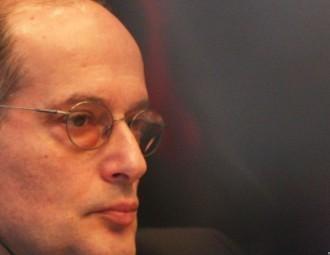Miklós Haraszti:Belarus must comply with international obligations to provide freedom of association

Belarus’ systematically restrictive regulations in regard to civil society organizations must be reviewed without delay, the Special Rapporteur said.
Miklós Haraszti, the United Nations Special Rapporteur on the situation of human rights in Belarus, welcomed the release from prison of human rights defender Ales Bialiatski, but called for the immediate and unconditional release of all political prisoners and their full rehabilitation.
In the interview with the HRC “Viasna” Haraszti mentioned that “in fact, the trumped-up charges against Bialiatski were directly linked to the fact that NGO activity is heavily curtailed by restricting access to funding”.
Let us recall that Viasna, which has provided legal assistance to Belarusians arrested or imprisoned during the crackdown on activists and journalists in the aftermath of the 2010 presidential elections, has repeatedly attempted to re-register with Belarusian authorities, following its dissolution by the Supreme Court in 2003. As a consequence, Viasna was not allowed to keep a bank account in Belarus and Bialiatski had to keep the account abroad. This is what the authorities used to accuse him of tax fraud.
The Special Rapporteur highlighted the systemic violations of the right to freedom of association, in particular the restrictive regulations relating to registration and activities of non-governmental organizations (NGOs) and the criminalization of membership in unregistered NGOs.
“Belarus must comply with its international obligations concerning freedom of association and create conditions to guarantee human rights defenders the ability to do their work in a safe and secure environment,” Haraszti said, expressing concern that Viasna has consistently been denied registration.
NGO legislation in force in Belarus requires lengthy and complicated registration procedures, bans the activity of unregistered associations and criminalizes membership in such organizations.
“Belarus’ systematically restrictive regulations relating to registration and activities of civil society organizations must be reviewed, without delay,” the Special Rapporteur said.
He also drew attention to the situation of those who remain imprisoned. “Like a number of other opponents and activists whose sentences appear to have been politically motivated, Bialiatski faced psychological and physical pressure while deprived of liberty and subjected to repeated arbitrary disciplinary punishments for allegedly violating the rules of the penal colony,” the Special Rapporteur said.
For now several political prisoners remain in detention in Belarus, including the 2010 presidential candidate Mikalai Statkevich, who is serving six years in prison on charges of organizing mass riots, ‘personal violence’ and resistance to public agents.
The Special Rapporteur noted that the Belarusian Government had received and accepted recommendations from other UN Member States to improve the human rights situations in the country and to fulfill their human rights obligations through the Universal Periodic Review process (UPR). However, he underscored that Belarus has not yet implemented the recommendation to take necessary measures to ensure freedom of expression and association and, specifically, to simplify the registration procedure for public associations, including NGOs, political parties and trade unions, to remove the prohibition against any activity by non-registered associations, and to abolish article 193-1 of the Criminal Code, which criminalizes the carrying out of an activity within such a non-registered organization.
-
03.01
-
07.10
-
22.09
-
17.08
-
12.08
-
30.09



























